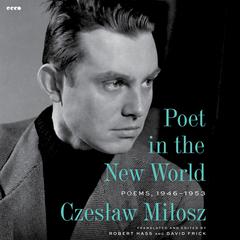 Play Audiobook Sample
Play Audiobook Sample
The Captive Mind Audiobook
 Play Audiobook Sample
Play Audiobook Sample
Quick Stats About this Audiobook
Total Audiobook Chapters:
Longest Chapter Length:
Shortest Chapter Length:
Average Chapter Length:
Audiobooks by this Author:
Publisher Description
The best-known prose work by the winner of the 1980 Nobel Prize for Literature examines the moral and intellectual conflicts faced by men and women living under totalitarianism of the left or right.
Written in the early 1950s, when Eastern Europe was in the grip of Stalinism and many Western intellectuals placed their hopes in the new order of the East, this classic work reveals in fascinating detail the often beguiling allure of totalitarian rule to people of all political beliefs and its frightening effects on the minds of those who embrace it.
Download and start listening now!
“Milosz’s political masterpiece The Captive Mind, published in 1953 and originally banned in the author’s native Poland… sets out to answer the question: How did the wisest of his postwar compatriots fall for Stalinism—that is, for a politics of lies and fear?…Trumpism is not Stalinism, but the relevance of Milosz’s insights—that intellectuals yearn to ‘belong to the masses’; that there is never a shortage of ways to justify cruelty in the name of the presumptively higher truth; that those who refuse to conform are caricatured as self-righteous purists—continues to haunt me…When Milosz won the Nobel Prize in Literature in 1980, the committee cited his ‘uncompromising clear-sightedness.’ Just so.”
— New York Times
Quotes
-
“A central text in the modern effort to understand totalitarianism.”
— New York Times Book Review -
“A faultlessly perceptive analysis…As timely today as when it was first written.”
— Jerzy Kosiński, award-winning Polish American novelist -
“Miłosz’s political masterpiece The Captive Mind, published in 1953 and originally banned in the author’s native Poland… sets out to answer the question: How did the wisest of his postwar compatriots fall for Stalinism—that is, for a politics of lies and fear?…Trumpism is not Stalinism, but the relevance of Milosz’s insights—that intellectuals yearn to ‘belong to the masses’; that there is never a shortage of ways to justify cruelty in the name of the presumptively higher truth; that those who refuse to conform are caricatured as self-righteous purists—continues to haunt me…When Milosz won the Nobel Prize in Literature in 1980, the committee cited his ‘uncompromising clear-sightedness.’ Just so.”
— New York Times
Awards
-
A New York Times Editor’s Choice
The Captive Mind Listener Reviews
- — Josh, 9/9/2023
About Czeslaw Milosz
Czeslaw Milosz (1911–2004) was born in Szetejnie, Lithuania, and made his high school and university studies in Wilno, then belonging to Poland. A cofounder of a literary group Zagary, he made his literary debut in 1930, published two volumes of poetry in the 1930s, and worked for Polish Radio. Throughout most of the Second World War, he spent his time in Warsaw working for the Polish resistance movement. In the diplomatic service of the Polish People’s Republic since 1945, Milosz broke with the government in 1951 and settled in France. Invited by the University of California, he moved to Berkeley in 1960, becoming a professor of Slavic languages and literatures the following year. In 1981 he was appointed to the Eliot Norton Chair at Harvard University. Among his many prizes and honors are the Neustadt International Prize for Literature, the Berkeley Citation (equivalent to an honorary PhD), the Nobel Prize in Literature, and membership in the American Academy of Arts and Letters.
About Stefan Rudnicki
Stefan Rudnicki first became involved with audiobooks in 1994. Now a Grammy-winning audiobook producer, he has worked on more than five thousand audiobooks as a narrator, writer, producer, or director. He has narrated more than nine hundred audiobooks. A recipient of multiple AudioFile Earphones Awards, he was presented the coveted Audie Award for solo narration in 2005, 2007, and 2014, and was named one of AudioFile’s Golden Voices in 2012.























